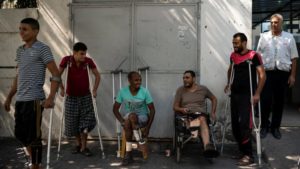In a briefing for members of the security cabinet, senior defense officials painted a threatening picture of the impending collapse of the Gaza Strip’s health system. According to reports of the briefing (Yaniv Kubovich, February 5), some 6,000 people wounded by live bullets are still awaiting urgent operations. About a quarter of them have developed serious infections, and without suitable care, will have to undergo an amputation. Tens of thousands of other wounded need medical treatment unobtainable in Gaza due to the severe shortage of equipment, medicine and specialists.
These descriptions aren’t new. International medical personnel who have examined the state of Gaza’s medical services in recent months have warned about the health system’s impending collapse, as well as about the obstacles Israel puts in the way of patients seeking to leave Gaza to obtain medical treatment in the West Bank or Israel. But so far, these reports don’t seem to have made much of an impression on the government, which continues to blame the Palestinian Authority and Hamas for the collapse of public services in Gaza.
This time, however, defense officials presented a new and particularly outrageous facet of the problem. “It will be hard to wage war in Gaza and obtain international support for the operation,” they warned. They even said international intervention would be likely because so many people, primarily the wounded, would be unable to obtain medical help.
In other words, it’s not the fate of the ill and wounded, or the collapse of a health system that serves more than two million Palestinians, that chiefly concerns the most moral army in the world. Rather, it’s the fear that the absence of health services will prevent or at least delay plans for war.
At first glance, this seems like an unprecedented display of consideration for the difficulties of Gaza’s population. After all, no country in the world would refrain from war because of the enemy’s lack of infrastructure. But the truth is that Israel has also never refrained from war for this reason, as evidenced by the tens of thousands of wounded who are still awaiting treatment.
Nevertheless, the defense officials’ warning joins previous warnings about the close connection between Gaza’s service infrastructure and economy and its civil uprising, and it makes the government directly responsible for the success or failure of any military operation in the territory. Perhaps this threat will finally move the government to fulfill its obligations as an occupying state and tend to the welfare of Gaza’s residents.
This article appears in its entirety.

